.
.
This space on Sunday is generally reserved for a single poet to read one of their works, but this week’s issue -Father’s Day – features 23 poets who weigh in on the complexity of their relationship with their father, revealing love, warmth, regret, sorrow – and in many cases a strong connection due to a common love of music.
Thanks to the poets who took part in this. As always, I hope you enjoy…
Joe Maita
Editor/Publisher
.
.
___
.
.
photo via RawPixel
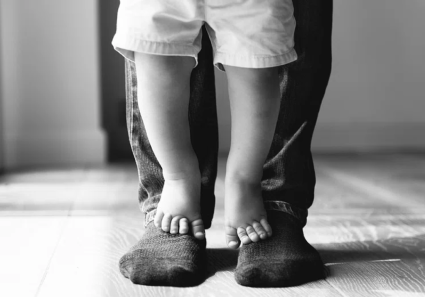
.
.
You Make the World Swing
the father took one bicycle
and made it last twenty years
fixing it every couple of years
for whoever was the youngest child
using found parts to keep it working
much like a jazzman can recycle
a famous song giving it new areas
of emphasis different rhythms
reshaping the melody borrowing
from other musicians ah father
saxman trumpet player pianist
all reinvent the world to bring joy
to listeners sons and daughters
hey daddy-o you make the world swing
.
by Michael L. Newell
.
___
.
Before Meeting
Named by his mother Wilmer Landon
but with few exceptions always known as Jack
a becoming farm boy left the soil for the water
…………………………………………….and War
as a Navy V6 volunteer
to an S2 Gunner’s Mate on the USS Franklin
and after that horrible battle, that human trial by combat,
a survivor returned to the Brooklyn Naval Yard unveiled
ready for the big city’s snap & music
combing through the Boroughs for records
78s, of the era’s Big Names
Benny Charlie Tommy & Count
finding The Delta Rhythm Boys
(with their anatomy lesson)
which he packed back home to Iowa.
Among the others of my memories
He was the first person to mention the name Jimmie Lunceford
.
by Terrance Underwood
.
___
.
All the Things You Are
………….(for Jack Jenkins)
My father liked Louis Armstrong
and he admired Buddy Rich,
but if he’d been a musician,
I think he’d have been like Lester Young,
as he had a taste for drink.
He had a fairness about him: He liked
Billie Holiday, especially the way
she sang “Strange Fruit.”
But I think if he’d loved jazz as I do
he would’ve heard “Stolen Moments” and
remembered the two of us walking hand
in hand in the snow, falling like sand.
Or he’d have appreciated “Autumn Leaves”
and remembered the smell of burning leaves
on a road in old Mexico.
Perhaps he would’ve heard those first notes
of Miles’ “So What” in Kind of Blue
as a way to transcend all of the darkness;
And if he’d heard Chet Baker’s version of
“All the Things You Are,” he might have
known the emptiness I felt upon his departure—
like a stranger in a strange land.
.
by DH Jenkins
.
___
.
Dancing with Monk
I think my father is Thelonious Monk.
He makes sure his pants crease stays.
Jazz musicians are men of style
and inspiration. I like how my father
walks down dark streets.
On Sundays, my father shines his shoes.
Music is his religion.
What did he play the night before
I was born?
Did he rise from the piano and do
his little Monk dance? Did he
strike a chord in celebration?
Sometimes he doesn’t say a word
but lets cigarette smoke rise
around the question of B flat.
.
by Miho Kinnas & E. Ethelbert Miller
.
___
.
singing: My Father
Blues on hold
Fedora / suit and tie
With the pocket square — your father
Reminding me of my father. A mellow
Sunday and no worries about a thing
in this world
O soulful glissando making me want to sing
Reimagined lyrics – “don’t worry ‘bout a thing”
Sundays mellow and wondrous; blue notes
On vinyl: A funky Jazz retrospective! And
We reside in days of clover with all of the
World’s Blues blown away
Singing: conversational
Turntable and a silver needle
Rounded blue notes and simplicity
On a track that feels meaningful —
Horace Silver plays a Song for My Father
On his Steinway Model D and in my mind I hear
Those reimagined lyrics: “don’t you ever lose
my number / and don’t you ever worry
about a thing”
Jazz genteel
And flatted fifths —
A sweet, relaxed Bossa Nova!
A song for and from my father
In cascading blue notes of memory;
In an afterlife of reimagined songs:
“don’t you ever lose my number /
and don’t you ever worry
about a thing”
.
by Connie Johnson
.
___
.
It’s De-Lovely
I was raised on the Dorsey Brothers,
Benny Goodman and Glenn Miller.
Rows of sleeved shellac records
stood on edge, side-by-side,
tightly packed into the cabinet
of the old Crosley phonograph.
At night, after the Cardinal
droned us through the rosary,
my father would
turn off the radio,
drop a record
on the turntable
and It’s De-Lovely
would reverberate
off the walls
in our tiny apartment
while he sat back in his chair,
head bobbin’, fingers tappin’
in time with Edythe Wright,
backed by The Esquires.
He was a serious man,
my father, and now,
when I think back,
I wish he had paid
closer attention
to the repeated line,
“Let yourself go.”
.
by Russell duPont
.
___
.
At Uncle David’s
Big mahogany cabinet,
shiny black records,
big bands, vocals,
these were my toys
in the early 40’s.
Dropped the discs
on the turntable,
like magic, sounds
of beautiful music,
Andrews Sisters, Benny Goodman,
Cab Calloway, Bing Crosby,
At Uncle David’s,
my surrogate grandfather,
those Sunday mornings
were my introduction to
jazz and the Great
American Songbook.
.
by Henry Wolstat
.
___
.
Poem For My Father (In The Key Of J)
1. In the beginning, I was ten years old—
sitting on the floor with shellac discs piled
and the world began to rotate at 78rpm
years before I was hypnotized by the revolutions
he was – as he made the rounds,
bought records on weekends
eager to get home to hear
Satchmo or Bix, Basie, Waller, The Boogie Woogie Trio
and primitive blues pianists with names like
Cow Cow and Romeo and Speckled Red
who rumbled the bass line but lost in surface noise
and dialect he could never
quite make out the words.
2. So we’d eat breakfast
thinking about music us two
to keep the day to our internal world
to dream of solos and flatted fifths
as variations of daily life.
3. And he would explain quietly to me
so that no outside forces would disturb our private club
his thoughts (as we listened) on how Armstrong built a solo
or so called Dixieland wove their instruments
without ever tripping each other up.
4. Years later visiting him
or he visiting me, I’d play The Jazz Messengers,
Monk, Sonny, Tadd and Mingus and he
would sit silently listening, reading album notes
taking it in, inhaling an updated dimension.
5. When CD’s came along
after years of having to Save, Save, Save
he cut loose and built a collection of roots –
Jelly Roll, King Oliver, Cab and Chick Webb
but expanded to Django and electric blues
and asked my advice on what Coltrane to buy.
6. We were as it finally became
or was it all along
an informal Socratic classroom
where we were as Father and Son
(without ever planning it)
both private tutors, student and teacher.
.
by Daniel W. Brown
.
___
.
The Lost Father
In The Wound and the Bow, Edmund Wilson
claims there’s an injury at the heart of all
art, a trauma at the center of creation.
All sons carry the wound of the lost Father,
and for generations the father disappeared
into jobs, into poverty, war and wandering.
The son goes searching for the father
in himself, and carries the father in himself,
as a ghost, a phantom, an unrealizable self.
Jelly Roll Morton never knew his father,
who also disappeared, yet carried the spirit
element of the missing father within him.
Jelly Roll Morton’s father played trombone.
They called him a four-flusher, a rounder,
a Juke Joint man looking for a good time.
Jelly Roll Morton, “father” of jazz, nevertheless
put notes for the voice of the sliding trombone
in his compositions for his ghost father to play.
.
by Douglas Cole
.
___
.
Being a Jazz Dad
…………………..is a difficult ROAD
I have/2 boys (men) & 4 girls (women)
…………………….“ Choices “
“can I do the gig and the family event”
…………..“Choices” “Conflicts”
…………………..tryin’ to DO BOTH
As a Jazz Dad there are many choices
gigs were scarce/therefore I did not want to cancel any
…………..“survival pressures” always there
& many times, I chose the GIG…for obvious reasons
Thinking back, my father was a ghost/ never in the mix
…I didn’t want to be like him. I wanted to be present
………………….be present & in the mix / the mix
………….Jazz Life/ Father /family/ choices
livin’ the BLUE NOTE LIFE
………….all the things at once
be a good & present DAD/ I wanted to be in the mix
…………..“Playin’ the correct changes”
When my kids were young, I stayed on the road
sometimes I would forget
…………….sometimes I would regret
………….I had to choose the best squeak or squawk
to blow thru the bell of my horn
…………109438…….. what’s that?
that’s the serial number of my alto sax
Oh yes! that was one my babies also
……………….“Bold Moves”
Confirm
…………..should I Confirm? I Confirmed!
……….constantly lookin’ for the right balance
juggling/juggling family & Jazz Life
………..Being a Jazz Dad
……………….is a difficult ROAD
….dealing with time & spirits / “Heavy Spirits”
dancin’ to the rhythm in 4/4 time 6/8 time 3/4 time Life time
……………..“So What”
…………..makin’ “Giant Steps”
Steps toward completeness of the Jazz Life Cycle
..Rhythm Changes/Avant Garde/Hard Blues /Ballad/Swing
lookin’ for the correct groove
…..the beat goes on & on & on & on……
…………Being a Jazz Dad
is a difficult ROAD
.
by Oliver Lake
.
___
.
Dear Father, Dear Duke
Dear Duke, you played piano for me, your favorite daughter,
when sleep vanished in the night. When I awake on rainy days
fatherless, the wind brings you back to memory savoring one by
one summer’s wild blueberries. Contagious was your smile like
a red tulip opening morning in Harlem.
Dear father, mother’s hands stroke your wavy
black hair in a dream. Sits where she can eat red
tomatoes from a vine with you or drink
your favorite from a soda fountain. Sunflowers turn
to God. She has turned her face only to yours in ragtime.
Dear Duke, my hips swing to It Don’t Mean a Thing,
If It Ain’t Got that Swing. Your vibrant eyes shimmer like a lake
from vibration of your song. I scat along with Ella wearing purple
rainboots as I stroll by pink hibiscus I’ve planted. Were you friends
with Armstrong? You shared the First Lady of Song. She carried
your big band on the tip of her tongue.
Dear father, the light of your caramel pigmented skin
created big shadows. Impeccable dresser always in a suit and tie.
Mother’s body kept close to yours for sliver of light not to appear.
How did you breathe during your last days on earth?
Essence of melodies not fragmented dance in air.
.
by Jerrice J. Baptiste
.
___
.
Father’s Day Gift
The sun in the Deep South
hangs like a limelight
over Bob in the parking lot,
who’s washing a starry rug
for the piano room where
his teenage daughter is playing
Beethoven’s Moonlight.
The serene melody flows
from her nimble fingers
to his eager ears,
a cool breeze brushing
his sweating face and forehead.
Bob pauses to listen.
When the pressure-washer
grinds cheerfully again,
his daughter joins Bob
with a jump and jive
on Hotter Than That.
In the joyous rhythm
flashes the smiling face
of Bob’s grandmother,
singing and swinging
in Armstrong’s jazz band
when she was a young butcher
in New Orleans.
.
by Jianqing Zheng
.
___
.
A Song for My Father (with Apologies to Horace Silver)
I have a picture on my wall, the heroes of jazz.
All men this time, no Billie, no Anita or Nina
No Ella. No Sarah.
Just the men of jazz, the heroes, the fathers as it were.
Horace Silver wrote a song for his father,
and a club owner I knew in snowy Maine who loved good jazz
named his baby son Thelonious.
Some say it was Buddy Bolden who was the father of jazz,
Bolden, that struttin’, mysterious
young man with a horn in New Orleans.
Some say it was Louis Armstrong who was the father of jazz,
and some say it was Charlie Parker, Dizzy Gillespie, Thelonious Monk.
Then there was Earl “Fatha” Hines.
So many fathers, so much jazz.
Growing up, it was my father,
The father who was my introduction to jazz.
You know kids, we all want hero dads,
the dads who do amazing things when in truth
most dads are pretty ordinary.
Given the choice I might have wanted a jazz dad,
a dad who made a saxophone wail or who owned a club.
But my dad worked in an office where he sent and received telegrams
all day, messages of joy, messages of loss.
He played no instrument,
But he could sing and he could dance and he loved the music.
Big bands were his sound, the 40s and early 50s.
You know kids, we learn so much from our dads.
My father taught me to ride a bike and later how to drive in the snow.
He taught me to listen to the music, his old 78 records on our
clunky turntable, the records loaded in a stack,
dropping to the turntable one big record at a time.
The Dorsey boys, Harry James, Artie Shaw, Duke Ellington,
Count Basie, Goodman, Miller, Stan Kenton, Ted Heath.
I loved them all.
My father was on the musical cusp. When big bands faded
and Bebop came in, he was in a different place, not ready for the change.
He didn’t hear Coltrane or Parker or Thelonious Monk,
Or if he did, he didn’t bring them home.
Years later, when we were both older,
I wrote to him about the man in Maine who owned a jazz club
and named his baby son Thelonious. And I introduced him to Sonny Rollins,
a joyous sound that carried my father across the cusp.
My father played no instrument, but he could sing and he could dance,
and he loved the music.
.
by Molly Larson Cook
.
___
.
Another Kind of Blue
……………John L. Briscoe, 1912-1965
Your mother raised me too as if
I were her own son, as you were.
That hovering, gray eyeless face of God
floating over, humming down from on high
in time with a time before the rocking crib,
was hers. At least I thought that peering face
was God’s, later, in the little flat in North Beach
where we boarded with the lady from Spain
who spoke through teeth that clacked like drumsticks
rapping soft on a snare-drum rim.
Those were unending days of a childhood
before she put me on board the ferry
for the eastbound California Zephyr
to live with you who became like her,
my mother and my father.
As she would later take in troubled boys,
and cook for eighty Mexican braceros
who sunup to sundown stooped over fields
in the summer heat of the San Joaquin Valley,
you shredded your life for the same ones.
One odd Father’s Day you bought yourself
a wooden cabinet you called a “Hi Fi,”
and five overlarge phonograph records
of Duke, Dizzy, Bird and the wildest,
Miles Davis’s “Kind of Blue,” and “Miles Ahead”
with Gil Evans, your friend who’d begun
in a long forgotten club in Capitola
where after Repeal you tended bar,
and for a time before.
Like your father, you too were killed, too young
and so you never got to hear me jam
with the Afro-American Jazz Band
in another venue that left behind
no wadded cocktail napkin, no matchbook cover,
or see my two kids take me Father’s Days
to the Franciscan Fathers dining room
in the groin of the grime of the Tenderloin
to serve up dinner, for hundreds of the hungry.
Sixty years on, on Fathers Day
these blues riffs, these odd strains of memory
still flitter, still natter.
Man, I so
………….want to be like
………………..So
…………………………What.
But can’t.
.
by John Briscoe
.
___
.
Father’s Day Moonglow
Whenever I think of my father,
music is not the top thought to
emerge in my mind. At least not
at first. The sounds in our house were
usually stormy dramas, upheavals
more akin to raging Wagnerian epics.
Today, I have decided to sweep
away echoes of past dramas from
memory’s lush libraries. Now, hints
of Benny Goodman’s sweet clarinet,
swinging low, leaping high, tease
me toward a different story.
Once, I watched my parents dancing
the Fox Trot to Benny Goodman’s big
band sound. It was “Moonglow,” on an
album from a movie biopic. Seduced
by swing, they swirled, twirled across
the living room like radiant ribbons.
For that too brief moment, they could well
have been Fred and Ginger. My mother
was smiling. My older father was mellow.
They were synchronized like the opulent
orchestra that backed them. Their moods
were lighter than air, like birds about to fly.
Later, when I read about Benny Goodman,
I saw why my father liked hm. Always
a perfectionist, acerbic, quick to
anger, slow to change. Skeptical of
difference. An old school guy trapped
in a world he could no longer control.
My mother sometimes sang along to a
recording of Peggy Lee with Goodman’s
band. Why Don’t You Do Right? she asked.
I wanted to hear her sing All I Need Is You,
Baby. My dad beside her, backed up by tender
clarinet, lush horns and passionate rhythms.
.
by Mary K O’Melveny
.
___
.
Memory of My Father
We lived on the dark side of the moon in a black hole
on earth; all light, all joy, sucked out of us, an orange
after being sliced, held to his mouth for its juice.
Sometimes when jazz music played on the record player,
light filtered out of the darkness. My feet stood solid on the tops
of his. My small hands held tightly to the backs of his knees.
Surrounded by sounds of Glenn Miller, Count Basie, Duke
Ellington, we danced atop musical notes; stardust in our eyes,
on our skin, stardust floating in kind of blue colors from ceiling to floor.
He, a magician of wonder. He, a brutal man, an enigma. Easy
to forget his transgressions when he put jazz music on the record player.
What does a seven year old know of the forbidden?
.
by Judith Vaughn
.
___
.
Today is Father’s Day
Today is Father’s Day
Dad’s Day for Jazz Daddies
Big daddies / Big Daddies of Jazz
Founding Father’s of the Jazz genre
Charles “Buddy” Bolden / Jelly Roll Morton
Duke Ellington / Count Basie
The great Louis “Satchmo” Armstrong
Big daddies / Big daddies of Jazz
Founding Father’s of the Jazz genre
Jazzy tunes in June
Big and small horns boom
Piano keys tinkled with fancy
Drums sync time masterfully
Upright bass laces phrases
Jazzy tunes in June
Some gone / New Fathers carry on
My Dad / Big E passed them on to me
We’d listen to them in his house
On his phonograph / Just he and me
Saluting one / Salute all the greats
Yeah / Dad’s Day for Jazz Daddies
Today is Father’s Day
.
by Emmett Wheatfall
.
___
.
Thinking of My Sons
………………….I always listen to what I can leave out.
……………………………………-Miles Davis
Some day,
perhaps,
my sons will honor
my memory,
the way I
slowly
learned
to honor my father’s.
In the long run
they will do what they do,
struggling with the right notes
to show their love,
like Miles listening
for what he could leave out,
the way we all do
thinking of our fathers.
.
by Juan Mobili
.
___
.
Bluebird of Happiness
Dad loved Jan Peerce.
On the Motorola turntable,
he would play his favorite song, “Bluebird of Happiness.”
Never versions from Jimmy Durante, Gracie Fields,
Jo Stafford and Gordan MacRea,
or the upbeat jazz version from Betty Carter.
Mr. Peerce would appease the beast within my Dad—
he would whistle along with the music.
Behind his back,
I laughed at the schmaltzy lyrics,
sang a parody of the cast of characters—
the beggar, the king, the jester, the peasant,
the artist, the poet, the actress,
even the ordinary schmuck on the street.
Those words were just words—
there were no bluebirds bringing hope to a child
seeking asylum from loneliness, school bullies,
and toxic opera on the home front.
If there was a bluebird of happiness,
it died when my brother pushed me into the record stand.
Ancient relicts of my parents’ RCA
and Decca black vinyl fell—
last rites were given on the floor or in the album sleeves.
Dad showed no reaction when Mom reported the news—
I guess he realized that the bluebird never came
and those words were just words to fill the abyss.
.
by Patricia Carragon
.
___
.
Soundtrack to My Father’s Life
He loved Gershwin, Herb Alpert, big bands, jazz.
My father studied violin at the Bryn Mawr Conservatory
of Music, a school started by his oldest brother, a lofty ambition
for the son of Italian immigrants and one of eight children.
The house felt barren after he left.
Music no longer sprang from corners of rooms.
I remember his favorites—“Yellow Bird,”
”Mood Indigo,” “Bye-Bye Blackbird.”
I salvaged his vinyl collection from the basement,
making space above ground for his 45s from Decca Records,
a 78 of Liberace’s “Dark Eyes,” a Bing Crosby tune
“When the Moon Comes Over Madison Square.”
Today I live near the park.
….a version originally appeared in the poet’s collection We Became Summer
.
by Amy Barone
.
___
.
A Change of Tune
When my dad was a teenager, he supported himself and his widowed mother playing tenor sax in the jazz bands of Prohibition New York. Not the toney wink-and-nod F. Scott Fitzgerald speakeasies graced by the likes of Duke Ellington and Fletcher Henderson. These were Hell’s Kitchen juke joints, hotel back rooms and the boozy blind pigs of the outer-boroughs.
Things could get rough.
In the pocket of his rented tuxedo, along with a pouch of extra reeds, he packed a loaded five-shot, nickel-plated .32-caliber revolver. “Never had to use it,” he told me. But the band said it made him a multi-instrumentalist.
The music ended with Pearl Harbor. After that, he played a lethal variety of weapons in the South Pacific. When I was a teenager, he bought me a .22 cal. single-shot rifle and taught me how to use it. Later as a soldier myself, I too became expert in an assortment of ominous firearms.
Dad died and I sold his Selmer
kept that old gun, though
wish it coulda been other way ‘round
.
by Brian Kates
.
___
.
I’m Old Fashioned
I love the old fashioned things
The sound of rain
Upon a window pane
The starry song that April sings
– Johnny Mercer (1942)
After a tedious day at the school
hammering improv techniques,
my hair tied in chordal knots like
a tired Socrates who said he knew that
he knew nothing, I’m meandering home
on my rickety Dutch bike with Coltrane
washing over me, and through me, like
a cleansing April rain, and a family
on the path up ahead slow down
the tempo just enough to make me
notice their kid’s weird and fabulous
pedaling style and wonder if one day
she’ll be either a) a star soccer player
or b) the next Art Blakey, but then
since this is hard bop Trane with
those crazy arpeggiated lines, I’m now
thinking: hold on a second, my own
daughter used to cycle that way, only
yesterday it seems: yes, my daughter
who now rocks with Arctic Monkeys,
wears baggy jeans and low-cut tops and,
like her mother, knows a bad proposition
when she sees it, never waffling about
my backward dress, or talk, and who
by golly, just like Blue Train, for all
the slick cleverness, pulls aboard
the slowest passenger, a ballad of all
things, the one ballad on the album,
and because a simple ride home
can easily morph into a journey through
time, I find myself thanking Jerome
Kern and Johnny Mercer all over again
for crafting this one beauty, this jazz-
bejeweled melody which, along with
the heady scent of chestnut blossoms,
sends me back to the era when movies
could not be paused and I’m trying
all over again, even before Fred Astaire
and Rita Hayworth have finished
whirling and crooning to this magic
moonlit number, yes, I’m trying to ask
my dad what in heck that one line
means: The starry song that April sings,
and he says, Wait a minute, because
in those days you were, like, spoiling
the fun if you spoke during a film
(even if it was on TV), and so later
when I pester him some more
he says something to the effect of,
Well, you see, the world is full
of blossoms in April, just like
the universe is full of stars, and if
you listen closely and recognize that
one beautiful tune, the one true
thing you were meant to hear,
then one day you’ll start dancing
like Fred Astaire –
which is probably why to this day
my fingers can’t stop hoping
for a miracle, that one shot
in the dark, the universal hit
landing where you want it to land,
whenever the band start comping
and my solo, this meek contribution,
slowly totters in.
.
by Francis Fernandes
.
___
.
Pall Mall Cigarettes
Unfiltered, he smoked
that would eventually help
take his life
but he didn’t care
he loved
life
Unfiltered
like the jazz he would listen to
straight no chaser
and he would chase her around
town in a custom made suit
and Florsheim
shoes, he’d choose her
like bill evans chose
his groove,
my dad would groove
with women who knew he wasn’t
all that, who knew he wasn’t about
intellect, though, he was about Miles
they would smile at him, and
ride with him, cos they knew
he was a man, who
would love them
as only a man can,
he was a man full of jazz,
his smile of working class, and
alcohol and dreams, a life
full of pizzazz,
how he loved his women
with class, sass and pizazz. this man
who kept a bottle of whisky under the
front seat of a chevy truck, his medicine
for dealing with being a Black man in
America,
this man, who found his riches
in liquor and pussy and dreams, this
man who gave me the gift of love and
life, through his jazz heartbeat
no, man, he ain’t dead !
I hear him
in every jazz album I own
.
by Erren Kelly
.
.
Listen to Ellis Marsalis (father) and Branford Marsalis (son) perform the Johnny Mercer/David Raskin composition “Laura,” from their 1996 album Loved Ones. [Columbia]
.
.
_____
.
.
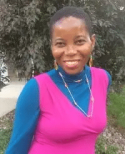
Jerrice J. Baptiste is a poet and author of eight books. Her poetry has been published and is forthcoming in Artemis Journal, Urthona: Buddhism & Art, Pensive: A Global Journal of Spirituality & The Arts, The Yale Review, Mantis, The Dewdrop, The Banyan Review, Kosmos Journal, Jerry Jazz Musician and elsewhere. She has been nominated as Best of The Net for 2022 by Blue Stem. Her poetry and collaborative songwriting are featured on the Grammy award nominated album- Many Hands: Family Music for Haiti.
.
.
___
.
.

Amy Barone’s poetry collection, Defying Extinction, was published by Broadstone Books in 2022. New York Quarterly Books published her book, We Became Summer. She wrote chapbooks Kamikaze Dance (Finishing Line Press) and Views from the Driveway (Foothills Publishing). Barone belongs to the Poetry Society of America. She lives in NYC.
.
.
___
.
.
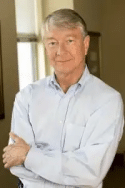
John Briscoe is a San Francisco poet, author and lawyer. He has published four books of poetry, and five of prose. He’s received the Oscar Lewis Award in Western History, first Prize in the Top Shelf Book awards, and other literary distinctions. His law practice for more than fifty years has included representing countries in disputes with other countries in international courts, and advising the United Nations in the aftermath of the Gulf War. He serves on the boards of several literary organizations, and is a distinguished fellow at the University of California, Berkeley.
.
.
___
.
.

Daniel W. Brown has loved jazz (and music in general) ever since he delved into his parents’ 78 collection as a child. He is a retired special education teacher who began writing as a senior. He always appreciates being published in journals and anthologies. At age 72 he published his first collection Family Portraits in Verse and Other Illustrated Poems through Epigraph Books, Rhinebeck, NY. Daniel writes daily about music, art and whatever else catches his imagination.
.
.
___
.
.
.
 Patricia Carragon is author of Angel Fire (Alien Buddha Press), Meowku (Poets Wear Prada), The Cupcake Chronicles (Poets Wear Prada), and Innocence (Finishing Line Press). All are available on Amazon.com. She is curator/editor-in-chief of Brownstone Poets, Brooklyn, NY
Patricia Carragon is author of Angel Fire (Alien Buddha Press), Meowku (Poets Wear Prada), The Cupcake Chronicles (Poets Wear Prada), and Innocence (Finishing Line Press). All are available on Amazon.com. She is curator/editor-in-chief of Brownstone Poets, Brooklyn, NY
.
.
___
.
.
photo by Jenn Merritt
 .
.
Douglas Cole has published six collections of poetry and The White Field, winner of the American Fiction Award. His work has appeared in several anthologies as well as journals such as The Chicago Quarterly Review, Poetry International, The Galway Review, Bitter Oleander, Chiron, Louisiana Literature, Slipstream, as well Spanish translations of work (translated by Maria Del Castillo Sucerquia) in La Cabra Montes. He is a regular contributor to Mythaixs, an online journal, and his “Trading Fours with Douglas Cole” is a regular feature on Jerry Jazz Musician. He lives and teaches in Seattle, Washington.
[Editor’s Note: Douglas recently participated in a conversation with two other Jerry Jazz Musician contributing writers titled “Why We Write,” which can be viewed by clicking here]
.
.
___
.
.
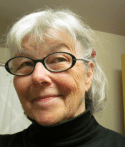
Molly Larson Cook is an award-winning Oregon writer, writing coach, and artist. In 2016, she received the first Steve Kowit Poetry Prize in a national competition. Molly was a Fellow at the Fishtrap Writers Conference in Oregon where she worked with poet Naomi Shihab Nye. Molly’s jazz novel, Listen, was published in a limited edition in 2003. Her “Colors of Jazz” paintings can be seen by clicking here.
.
.
___
.
.

Russell duPont is an artist and an author whose artwork is included in a number of public and private collections. He has published three novels, King & Train , Waiting for the Turk and Movin’ On, the sequel to King & Train; two books of poetry; and two non-fiction chapbooks. His essay, “The Corner,” is included in the anthology Streets of Echoes. His work has been published in various newspapers and literary magazines. He was the founder & publisher of the literary magazine, the albatross.
.
.
___
.
.
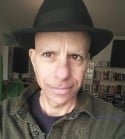
Francis Fernandes grew up and studied in Montréal, Canada. Since spring 2020, his writing has appeared in over twenty literary journals, including Modern Poetry Quarterly Review, Saint Katherine Review, The Orchards Poetry Journal, Third Wednesday. He lives in Frankfurt, Germany, where he writes and teaches.
.
.
___
.
.

DH Jenkins’ poems have appeared in Jerry Jazz Musician, Kelp Journal, and The Ekphrastic Review. His new book of poetry, Patterns on the Wall, is available on Amazon.com. He lives in New Zealand.
.
.
___
.
.
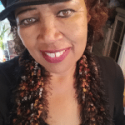
Connie Johnson is a Los Angeles, California-based writer who has twice been nominated for a Pushcart Prize. Her poetry has appeared or will be forthcoming in Iconoclast, Haight-Ashbury Literary Journal, Jerry Jazz Musician, San Pedro River Review, Cholla Needles 85, Shot Glass Journal, Voicemail Poems, Misfit Magazine, Mudfish 23,, Exit 13, Glint Literary Journal, Rye Whiskey Review and Door Is a Jar.
Click here to read the Jerry Jazz Musician-published In a Place of Dreams: Connie Johnson’s album of jazz poetry, music, and life stories
.
.
___
.
.
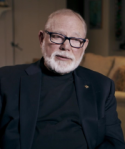
Brian Kates’ journalism has won a Pulitzer Prize, George Polk Award and other honors. His non-fiction book, The Murder of a Shopping Bag Lady, a saga of American homelessness, was a finalist for Mystery Writers of America’s Edgar Allan Poe Award. Brian’s poetry has appeared in Banyan Review, Paterson Literary Review, Third Wednesday and elsewhere. He lives with his wife in a house in the woods in the lower Hudson Valley.
.
.
___
.
.
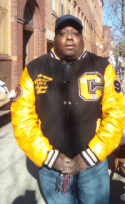
Erren Kelly is a three-time Pushcart nominated poet from Boston whose work has appeared in 300 publications (print and online), including Hiram Poetry Review, Mudfish, Poetry Magazine, Ceremony, Cacti Fur, Bitterzoet, Cactus Heart, Similar Peaks, Gloom Cupboard, and Poetry Salzburg.
Click here to read “Under Quarantine” — COVID-era poetry of Erren Kelly, published by Jerry Jazz Musician
.
.
___
.
.

Miho Kinnas is a poet and translator living in Hilton Head Island, South Carolina. Her latest book is Waiting for Sunset to Bury Red Camellias (Free Verse Press, 2023). She has published a book of poems in collaboration with E. Ethelbert Miller, We Eclipse into the Other Side (Pinyon Publishing).
.
.
___
.
.

Oliver Lake is a saxophonist, composer, arranger, and bandleader who in 1977 founded the World Saxophone Quartet. He has performed on more than 80 albums. In addition to his musical endeavors, Oliver is also an accomplished poet, painter and performance artist. He has published two books of poetry, and has exhibited and sold his artwork internationally.
Click here to visit his website
.
.
___
.
.

E. Ethelbert Miller is a poet and literary activist living in Washington D. C. His latest book is How I Found Love Behind the Catcher’s Mask: Poems (City Point Press, 2022) and he was a nominee for a Grammy in the 2023 Spoken Word Album category with his Black Men Are Precious album.
He has published a book of poems in collaboration with Miho Kinnas, We Eclipse into the Other Side (Pinyon Publishing).
.
.
___
.
.

Juan Pablo Mobili was born in Argentina. His poems appeared in The American Journal of Poetry, Hanging Loose Press, Paterson Literary Review, among others, as well as many journals around the world. He received multiple nominations for the Pushcart Prize, and his chapbook, Contraband, was published in 2022.
.
.
___
.
.
Michael L. Newell lives on the Atlantic Coast of Florida. His most recent book of poems is Passage of a Heart.
.
.
___
.
.
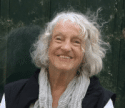
Mary K O’Melveny, retired labor rights lawyer, lives with her wife near Woodstock, NY. Mary became a fan of Jazz as a very young girl listening to Louis Armstrong and Lester Young on her grandparents’ Victrola record player. Mary’s award-nominated poetry appears in many print and on-line literary journals, anthologies and national blog sites. Mary has authored three poetry collections. Her just-released fourth book, Flight Patterns, is available by clicking here
Click here to visit her web site
.
.
___
.
.
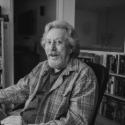
Terrance Underwood is a retired Gas Turbine Package Engineer whose career offered opportunities to work all over the world. A devoted jazz enthusiast, his first memory operating a mechanical devise was a 4-speed spindle drop record changer for his father’s collection of 78s.
Click here to read Proceeding From Behind: A collection of poems grounded in the rhythmic, relating to the remarkable, by Terrance Underwood
.
.
___
.
.

Judith Vaughn lives in Sonoma, California. She is a member of PoeticLicenseSonoma who read their poetry the 4th Tuesday of each quar-ter at Sebastopol Center for the Arts in Sebastopol, CA; and Redwood Writers’, A branch of the California Writers Club.
.
.
___
.
.
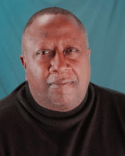
Emmett Wheatfall is a poet and recording artist. He has authored published books of poetry. His 2018 publication As Clean as a Bone is an Eric Hoffer Book Award Finalist as well as a da Vinci Eye Award Finalist. He’s has also released albums of spoken jazz, blues, gospel poetry. Click here to visit his website.
.
.
___
.
.
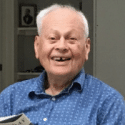 Henry Wolstat is a retired psychiatrist now in his 90’s living in the greater Boston area with his wife. He is the author of a poetry book, Driftwood, and he has also been published in printed and online anthologies. He is passionate about running, the arts, and poetry.
Henry Wolstat is a retired psychiatrist now in his 90’s living in the greater Boston area with his wife. He is the author of a poetry book, Driftwood, and he has also been published in printed and online anthologies. He is passionate about running, the arts, and poetry.
.
.
___
.
.
Jianqing Zheng is the author of The Dog Years of Reeducation (Madville Publishing, 2023) and A Way of Looking (Silverfish Review Press, 2021). He teaches at a historically black institution in the Mississippi Delta.
.

































A wonderful assortment of memories of our fathers. I’m very pleased to have joined them! Thanks.
Great memories; great poems.
In the words of Michael L. Newell:
“hey daddy-o you make the world swing”
To all the fathers out there — “Happy Father’s Day!”
Fabulous issue. Thank you, Joe, for supporting us poets.
I love the poems, I love being part of it. Such a nice honor for all our Dad’s!
What a great series of poems–wonderful memories and reflections on our fathers,
and also on the Fathers of Jazz!